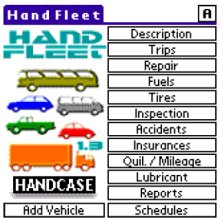ISV announces Palm Linux ports
Jan 21, 2009 — by Eric Brown — from the LinuxDevices Archive — 1 views Brazilian independent software vendor (ISV) Handcase says it is porting about 100 of its PalmOS applications to the Linux-based WebOS platform set to debut in Palm's forthcoming Pre smartphone. Handcase is also translating some 323 of its PalmOS apps from Portuguese to English, it says.
Brazilian independent software vendor (ISV) Handcase says it is porting about 100 of its PalmOS applications to the Linux-based WebOS platform set to debut in Palm's forthcoming Pre smartphone. Handcase is also translating some 323 of its PalmOS apps from Portuguese to English, it says.
(Click for larger view of Handcase logo on Palm Pre)
When the Palm Pre and Palm's new Linux-derived WebOS stack were announced to widespread acclaim earlier this month at CES, one obvious drawback was the initial lack of software — the Pre is not backward compatible to the PalmOS operating system used on devices such as the Palm Treo. The PalmOS software ecosystem boasts about 30,000 serviceable mobile software applications, many still in widespread use despite getting on in years.
Handcase hopes to fill the gap by offering dozens of PalmOS apps concurrent with the Pre's launch sometime in the second quarter. It says it has readied 70 English-language WebOS apps so far, and hopes to have 100 completed by the end of the year. The Handcase applications for the Pre are said to include user, corporate, professional, medical, personal, entertainment, utilities, and security apps.


Handcase's English-language PalmOS applications range from games like Pirates (left)
to vertical-market apps like the HandFleet fleet management program (right)
(Click on either to enlarge)
Handcase has been working with Palm for almost a year on the porting project, says the company. At the Pre announcement, Palm said it would depend on third parties to port the older software over to WebOS.
Another option for users interested in running older PalmOS apps on the Pre and other WebOS-based devices might be to use the Access Garnet virtual machine. Access recently ported the VM to the Maemo environment used in the newest Linux tablets from Nokia, and is likely to offer a port to WebOS as well (though none has been announced, that we know of). However, running apps within a VM has obvious drawbacks, such as limited access to memory resources, limited integration with native apps such as UI elements, and the need to run multiple VMs for each PalmOS application (Garnet being a single-tasking environment). Thus, native WebOS ports such as those from Handcase should appeal more to new Palm users.
The Linux-derived WebOS leverages industry standard technologies, including CSS, XHTML, and JavaScript, says Palm, presumably using a technology such as Movial's just-open-sourced Browser Dbus Bridge to give privileged Javascript access to operating system-level APIs. The UI itself is apparently rendered by Webkit, according to reports. Few details on WebOS will likely emerge until the Pre ships this Spring. The stylishly designed Palm Pre features a slide-out keyboard, 3G cellular, WiFi, GPS, a 3-megapixel camera, and a 3.1-inch touchscreen. Learn more in our previous coverage, here.
This article was originally published on LinuxDevices.com and has been donated to the open source community by QuinStreet Inc. Please visit LinuxToday.com for up-to-date news and articles about Linux and open source.